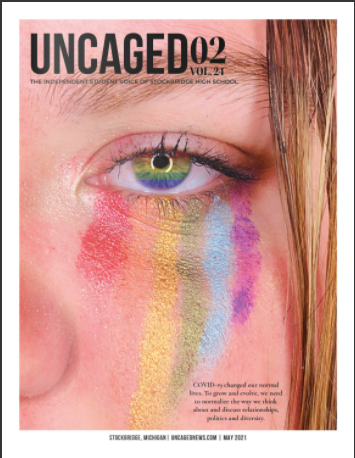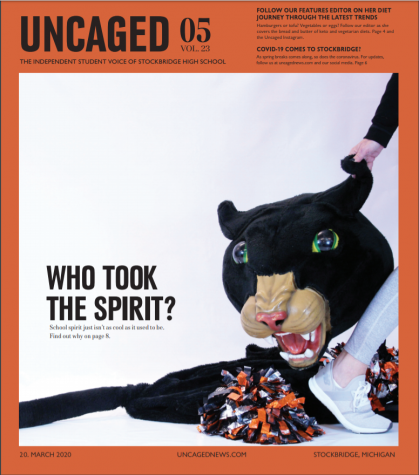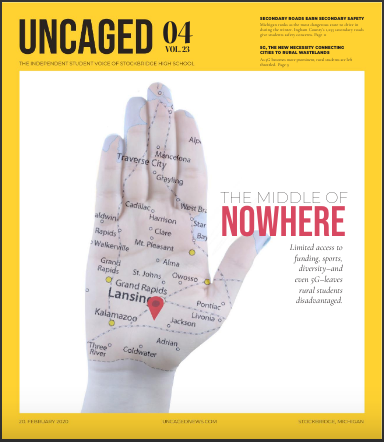Be yourself
Herd mentality pervasive among the ranks of student body
“You should just leave this school.”
“Go jump off a bridge.”
“We don’t like you, you aren’t liked here.”
These are a few things that junior Jeffery Debozy has been told by others in the community. While these are devastating comments, Debozy is not the only one who faces this taunting.
In a poll of 50 students, 64.1% of students reported that they feel comfortable acting like their own true natures in the school community.
“Kids in our school discriminate against people wearing different clothes, if someone doesn’t wear a certain brand, or is acting different,” freshman Cheyenne Bickley said.
Bullying: It’s here. It’s everywhere, and it won’t stop unless something is done to stop it.
Herd mentality, defined in the Oxford Dictionary as “the tendency for people’s behavior or beliefs to conform to those of the group to which they belong,” is the root of the problem. Students are too afraid to break away and be different for fear of rejection. A strong majority, 84.6% of students, said they felt that they are different from others in the community.
And, nearly half of the respondents, 40%, indicate that they feel that they sometimes have to censor either themselves or their wardrobe.
“A lot of people are judgemental,” sophomore Isabella Scutchfield said. “People made fun of me when I dyed my hair blonde. They said I had noodle hair.”
Feelings of being different are not just limited to school, and the problem of herd mentality follows students into adulthood.
Add to the problem, cultural capital, defined by Dictionary.com as “the skills, education, norms, and behaviors acquired by members of a social group that can give them economic and other advantages.” This is the currency that society runs on, and everyone wants more.
Young people show evidence of conforming to the cultural norms for means of acceptance, yet 38% of the students surveyed said they feel that they are not properly represented in the media.
“I don’t see myself as the stereotypical high schooler,” Debozy said. “I don’t have straight As, and I don’t play sports.”
Debozy’s outlook may be conditioned by the media consumed by teens around him.“The media portrays people like me as not good, school shooters. Everyone has prejudices against me,” Debozy said.
Despite the overwhelming pressure to blend in and be a part of the stream, not everyone wants to go with the flow.
“I’m the only me there is. On the media, I have to be someone else to appeal to people’s standards,” freshman Joseph Cool said. “People are fake at school for attention, popularity.”
The pull to blend in does not call to everyone, some are not afraid to be true to themselves.
This is not just a school problem. It is a society problem.
Humans are social creatures‒they form groups with people similar to them.
Teens want to be liked by others, to feel valid. They make themselves like everyone else to fit in. Standing out and being different risks being isolated, being alone. But blending leaves many unnoticed.
Yet, those who are idolized and remembered stood out in some way. Celebrities or historical figures got to where they are by being different, going against the flow.
Standing out is how idols are made. Those who stand out can make a difference.
Break away from the herd and be different.
Well known stand outs also inspires others to do the same; it creates a domino effect. It encourages people to be themselves. The hardest part is the first step.
“Don’t be afraid to be the first,” Muslim supermodel Halima Aden said in wake of the national discussion about her photoshoot in a hijab and burkini in Sports Illustrated magazine.
Rosa Parks and many others have stood up to be themselves, to be the first, and they made a difference. To stand out is to be authentic and to do what you do, not what everyone else is.
There may be safety in numbers but there is power in the few, the different.
When everyone behaves the same, they think the same. It is easy to control and manipulate people when they will go with what everyone else does. All it takes is one person, and many take advantage of it.
“Being like everyone else is really boring,” junior Chris Kaltner said. “It makes you feel like you have to be in a certain place with certain people because you have to be, not because you want to be.” 








